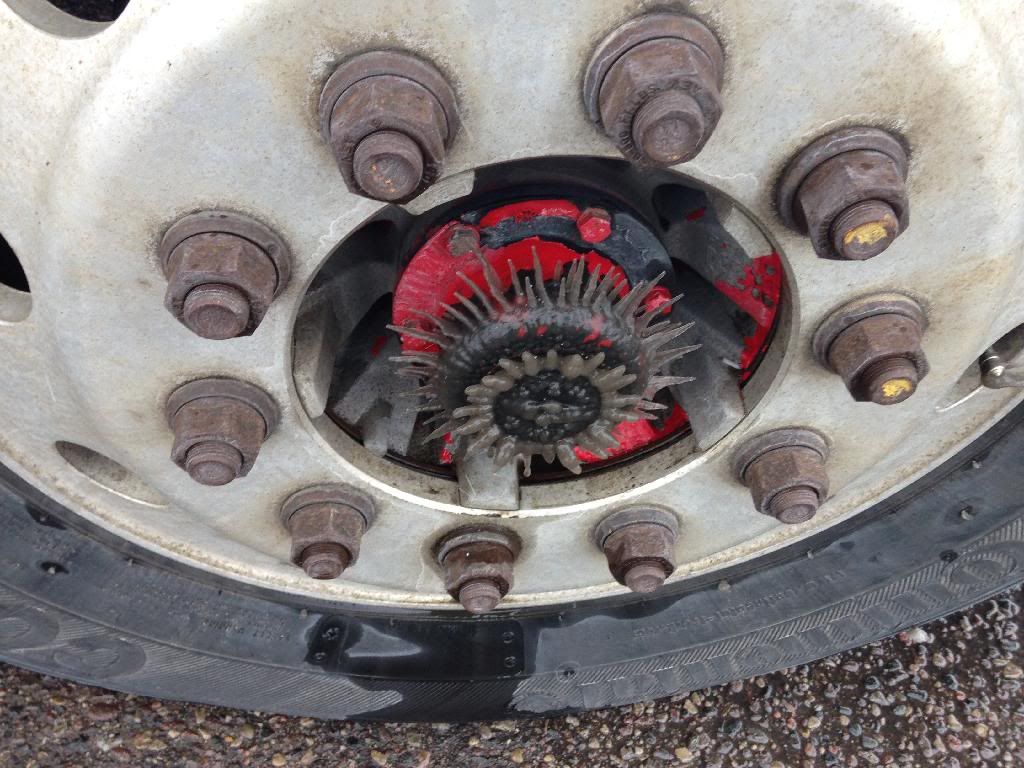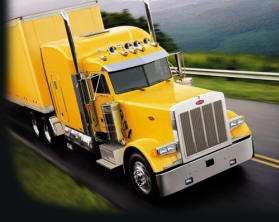Finally A Few Days Off...
Topic 3188 | Page 1
Hey that's awesome Bruce!
Getting information from the oil fields is tough. We don't get as much as we'd like. Now I've heard a lot of jobs require drivers to do some physical labor on the job sites but it sounds like you're not required to do anything except drive, is that correct?
And does your company regularly hire drivers straight out of school without OTR experience? A lot of drivers consider the oil fields as an option but information is scarce so it's hard to point people in the right direction.
OTR:
Over The Road
OTR driving normally means you'll be hauling freight to various customers throughout your company's hauling region. It often entails being gone from home for two to three weeks at a time.

One of the guys in my class got a job in North Dakota doing a water truck. He has no experience other than the 3 weeks of school. He had a buddy from the military out there. He talked to the guys boss on the phone and did an interview. He was hired after talking. He said he was starting at $20 an hour. It is a similar set up as the OP. He will work 12 hours a day and be on call for like 4 more. It is like 7 on 4 off or something like that. They said he will work roughly 70 hours a weeks. He gets OT for anything over 40 hours. He told me and the other guy in our class that the company he was going to had 2 more spots. We both decided to get our year OTR first. My question is: If the oil field drivers are making so much money and it is so great, why are they always in need of drivers? It seems to me that every person starting out would just get a CDL - A and go out there. I would think they would have a waiting list of people wanting to get hired.
CDL:
Commercial Driver's License (CDL)
A CDL is required to drive any of the following vehicles:
- Any combination of vehicles with a gross combined weight rating (GCWR) of 26,001 or more pounds, providing the gross vehicle weight rating (GVWR) of the vehicle being towed is in excess of 10,000 pounds.
- Any single vehicle with a GVWR of 26,001 or more pounds, or any such vehicle towing another not in excess of 10,000 pounds.
- Any vehicle, regardless of size, designed to transport 16 or more persons, including the driver.
- Any vehicle required by federal regulations to be placarded while transporting hazardous materials.
OTR:
Over The Road
OTR driving normally means you'll be hauling freight to various customers throughout your company's hauling region. It often entails being gone from home for two to three weeks at a time.
That schedule is a rough one, housing can be expensive and difficult to find, the work often times involves at least some manual labor, and of course you have to live within commuting distance of Nowhere, North Dakota or Noplace, Texas where these rigs are usually setup.
The one fella said he's being flown back and forth on the weekends but is staying on-site during the week.
And of course making better pay can easily bump you into a little higher tax bracket so the bottom line take home pay might take a little hit there. I'm also not sure what tax write-offs you would qualify for if you commute to and from work every day. You get a hefty meal allowance if you travel Interstate but I don't know what you would get in the oil fields. Without that write-off your bottom line take home pay would certainly take a big hit.
Turbo Dan has some cool photos from the oil fields.
Interstate:
Commercial trade, business, movement of goods or money, or transportation from one state to another, regulated by the Federal Department Of Transportation (DOT).

Yup, many companies in the oilfield hire drivers straight out of school, and several actively recruit. I'm going back out for 12 days, will be home 2, then fall into a regular rotation of 5 on and 3 off. I commute from my home here in Del Rio, Texas which puts my office about 2.5 hours from here. This was actually better than most of the OTR companies I spoke to who wanted me to park what they called my take home truck at the terminals in or around Dallas, or Laredo. Pay for starting drivers is between 15-20 dollars per hour depending on what company your with. Im happy where Im at as this company has the most solid record of longevity and stability. Some companies provide quarters, and some do not. I share a 2BR/2BA place with my brother in law and another driver. As far as labor, it isnt much, just hook up a hose, make sure you have the proper cam lock adapter, and start pumping... Probably akin to what a fuel hauler does. I will take some pics this next time Im out. As for why they are always in need of drivers, I cant really say. I do know that there are a ton of people who jump from company to company, lol much like EMS people... As far as income and taxes, I have a small screen printing and graphics company, so Im still in that phase of being able to claim the intent to profit and write everything off. I do know that the oilfield has very extreme ups and downs, so I am planning and saving as if it wont be here tomorrow.
Take care,
Bruce
Terminal:
A facility where trucking companies operate out of, or their "home base" if you will. A lot of major companies have multiple terminals around the country which usually consist of the main office building, a drop lot for trailers, and sometimes a repair shop and wash facilities.
OTR:
Over The Road
OTR driving normally means you'll be hauling freight to various customers throughout your company's hauling region. It often entails being gone from home for two to three weeks at a time.
HOS:
Hours Of Service
HOS refers to the logbook hours of service regulations.New Reply:
New! Check out our help videos for a better understanding of our forum features

















Preview:
This topic has the following tags:
Truck Driving Stories







 TT On Facebook
TT On Facebook
Just got back from my first week at the new job. Not sure if anyone else is driving in the oilfield, as it seems to be mostly OTR. I will say I like everything so far about the company I signed on with, lol except for the physical which was on par with trying out for a SWAT Team... Beyond that it no worries. The equipment we have, while run hard 24 hours around the clock, is excellent. Peterbuilt trucks purpose built for this company. So, Im currently operating a 135 bbl tank truck, designed to transport oilfield fluids, mostly flow back water to recycling, and disposal. Working 12 hours shifts, 5 on 3 off, the company provides living quarters for those of us who commute. The job itself is super easy... Pull up, suck water, go to recycling. Sometimes, pull up, drop off water. Locations are all within 50 miles, so its not a far piece...
Now to figure out what to put on the BBQ pit...
Drive safely...
Bruce
OTR:
Over The Road
OTR driving normally means you'll be hauling freight to various customers throughout your company's hauling region. It often entails being gone from home for two to three weeks at a time.
HOS:
Hours Of Service
HOS refers to the logbook hours of service regulations.